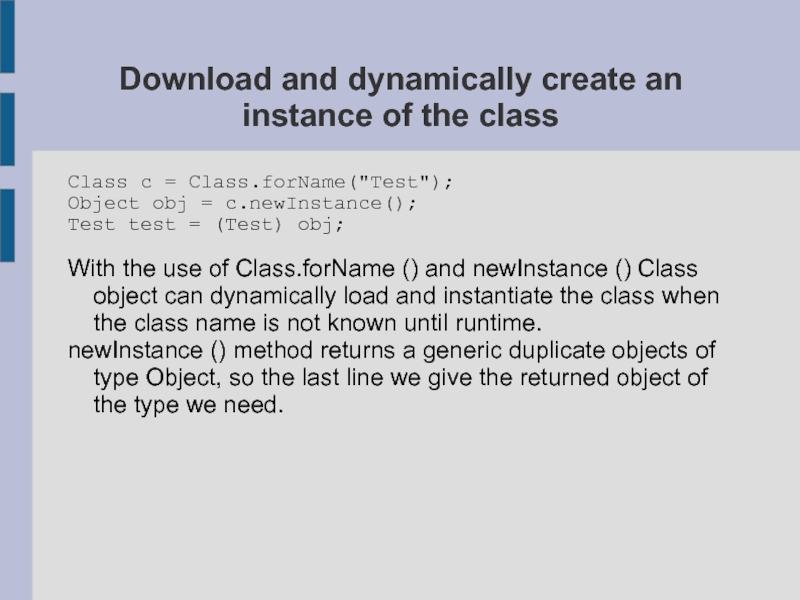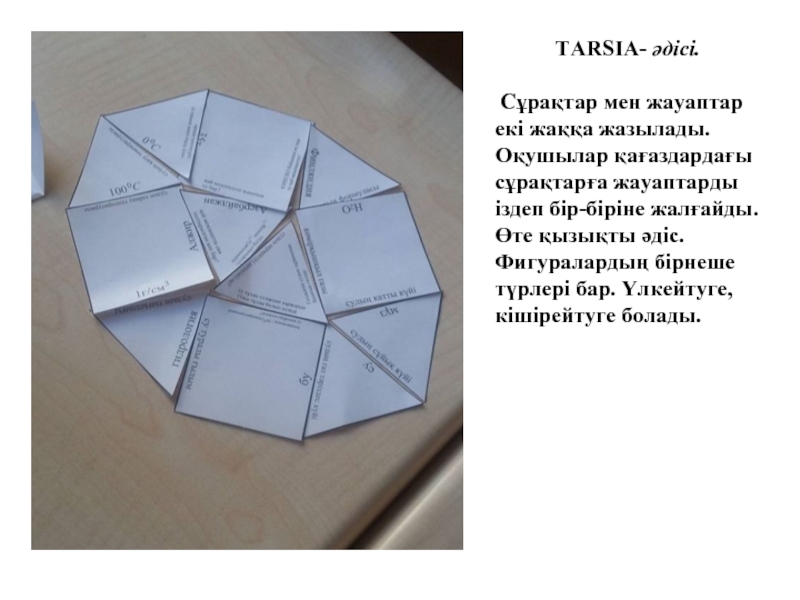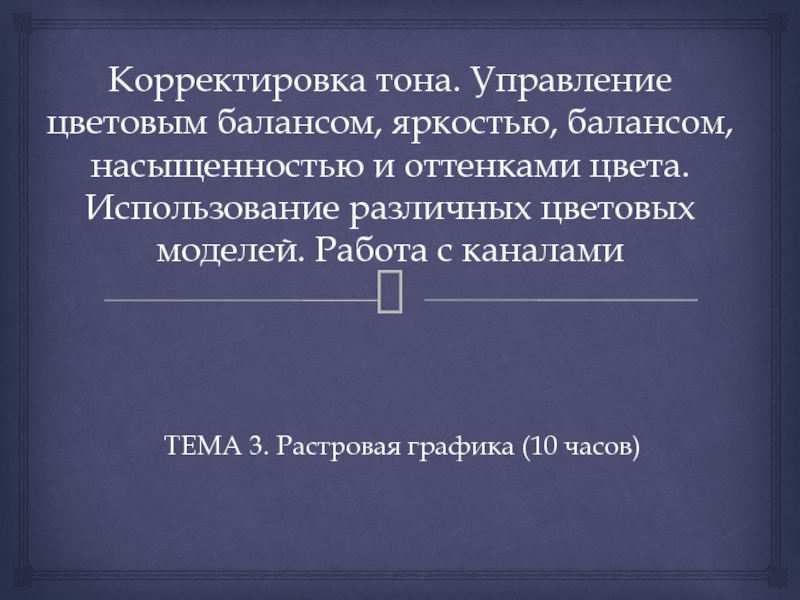data about the program during its execution. Reflection allows us to investigate the information about the fields , methods and constructors of classes. Reflection in Java by using Java Reflection API. This API consists of classes java.lang package and java.lang.reflect.
- Главная
- Разное
- Дизайн
- Бизнес и предпринимательство
- Аналитика
- Образование
- Развлечения
- Красота и здоровье
- Финансы
- Государство
- Путешествия
- Спорт
- Недвижимость
- Армия
- Графика
- Культурология
- Еда и кулинария
- Лингвистика
- Английский язык
- Астрономия
- Алгебра
- Биология
- География
- Детские презентации
- Информатика
- История
- Литература
- Маркетинг
- Математика
- Медицина
- Менеджмент
- Музыка
- МХК
- Немецкий язык
- ОБЖ
- Обществознание
- Окружающий мир
- Педагогика
- Русский язык
- Технология
- Физика
- Философия
- Химия
- Шаблоны, картинки для презентаций
- Экология
- Экономика
- Юриспруденция
Java Reflection: A Basic Introduction презентация
Содержание
- 1. Java Reflection: A Basic Introduction
- 2. Using Java Reflection API interface , you
- 3. Getting the object class type MyClass
- 4. Getting the class name Class c
- 5. Research modifiers class Class c = obj.getClass();
- 6. Finding the superclass Class c = myObj.getClass();
- 7. Research information on the method , the
- 8. Research information on the method , the
- 9. Research information on the method , the
- 10. Download and dynamically create an instance of
Слайд 2Using Java Reflection API interface , you can do the following:
Determine
the object class .
Get information about modifiers classes , fields, methods, constructors, and superclasses .
To find out what constants and methods belong to the interface.
Create an instance of a class whose name is not known until runtime.
Get and set the value of the object.
Call the object method.
Create a new array , the size and type of components which are not known until runtime programs.
Get information about modifiers classes , fields, methods, constructors, and superclasses .
To find out what constants and methods belong to the interface.
Create an instance of a class whose name is not known until runtime.
Get and set the value of the object.
Call the object method.
Create a new array , the size and type of components which are not known until runtime programs.
Слайд 3Getting the object class type
MyClass a = new MyClass();
Class aclass
= a.getClass();
If we have an instance of the Class object we can get all possible information about this class , and even perform operations on it .The above method getClass () are often useful when there is then an object instance , but do not know what class this instance . If we have a class that is known at compile time type, get a copy of the class is even easier .
Class aclass = MyClass.class;
Class iclass = Integer.class;
If we have an instance of the Class object we can get all possible information about this class , and even perform operations on it .The above method getClass () are often useful when there is then an object instance , but do not know what class this instance . If we have a class that is known at compile time type, get a copy of the class is even easier .
Class aclass = MyClass.class;
Class iclass = Integer.class;
Слайд 4Getting the class name
Class c = myObject.getClass();
String s = c.getName();
An
object of type String, returned by getName (), will contain the fully qualified name of the class , that is, if myObject is the object type Integer, the result is the type java.lang.Integer.
Слайд 5Research modifiers class
Class c = obj.getClass();
int mods = c.getModifiers();
if
(Modifier.isPublic(mods)) {
System.out.println("public");
}
if (Modifier.isAbstract(mods)) {
System.out.println("abstract");
}
if (Modifier.isFinal(mods)) {
System.out.println("final");
}
System.out.println("public");
}
if (Modifier.isAbstract(mods)) {
System.out.println("abstract");
}
if (Modifier.isFinal(mods)) {
System.out.println("final");
}
Слайд 6Finding the superclass
Class c = myObj.getClass();
Class superclass = c.getSuperclass();
To
get all parent superclasses , you need to recursively call the method getSuperclass ().
Слайд 7Research information on the method , the method call .
Class c
= obj.getClass();
Method[] methods = c.getMethods();
for (Method method : methods) {
System.out.println("Name: " + method.getName());
System.out.println("Returned type: " + method.getReturnType().getName());
Class[] paramTypes = method.getParameterTypes();
System.out.print("Params's types: ");
for (Class paramType : paramTypes) {
System.out.print(" " + paramType.getName());
}
System.out.println();
}
Method[] methods = c.getMethods();
for (Method method : methods) {
System.out.println("Name: " + method.getName());
System.out.println("Returned type: " + method.getReturnType().getName());
Class[] paramTypes = method.getParameterTypes();
System.out.print("Params's types: ");
for (Class paramType : paramTypes) {
System.out.print(" " + paramType.getName());
}
System.out.println();
}
Слайд 8Research information on the method , the method call .
Methods getMethod
() and getMethods () return only the public methods , in order to get all the methods of the class regardless of the type of access you need vospolzovatsya methods getDeclaredMethod () and getDeclaredMethods (), which work just as well as their analogues (getMethod () and getMethods ()).
Java Reflection Api interface allows you to dynamically invoke a method , even if at the time of compilation of this method is the name of the unknown ( Class method names can be obtained by getMethods () or getDeclaredMethods ()).
Java Reflection Api interface allows you to dynamically invoke a method , even if at the time of compilation of this method is the name of the unknown ( Class method names can be obtained by getMethods () or getDeclaredMethods ()).
Слайд 9Research information on the method , the method call .
Class c
= obj.getClass();
Class[] paramTypes = new Class[] { String.class, int.class };
Method method = c.getMethod("getCalculateRating", paramTypes);
Object[] args = new Object[] { new String("First Calculate"), new Integer(10) };
Double d = (Double) method.invoke(obj, args);
Class[] paramTypes = new Class[] { String.class, int.class };
Method method = c.getMethod("getCalculateRating", paramTypes);
Object[] args = new Object[] { new String("First Calculate"), new Integer(10) };
Double d = (Double) method.invoke(obj, args);
Слайд 10Download and dynamically create an instance of the class
Class c =
Class.forName("Test");
Object obj = c.newInstance();
Test test = (Test) obj;
With the use of Class.forName () and newInstance () Class object can dynamically load and instantiate the class when the class name is not known until runtime.
newInstance () method returns a generic duplicate objects of type Object, so the last line we give the returned object of the type we need.
Object obj = c.newInstance();
Test test = (Test) obj;
With the use of Class.forName () and newInstance () Class object can dynamically load and instantiate the class when the class name is not known until runtime.
newInstance () method returns a generic duplicate objects of type Object, so the last line we give the returned object of the type we need.
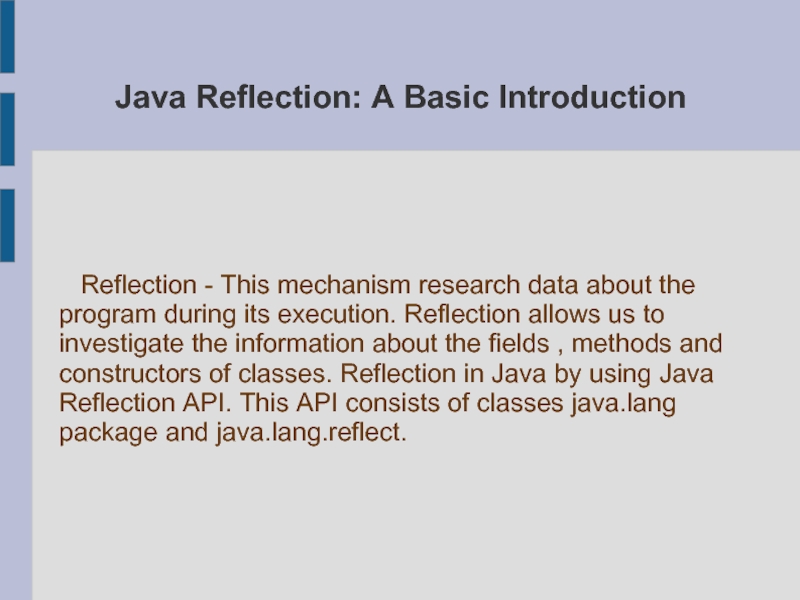
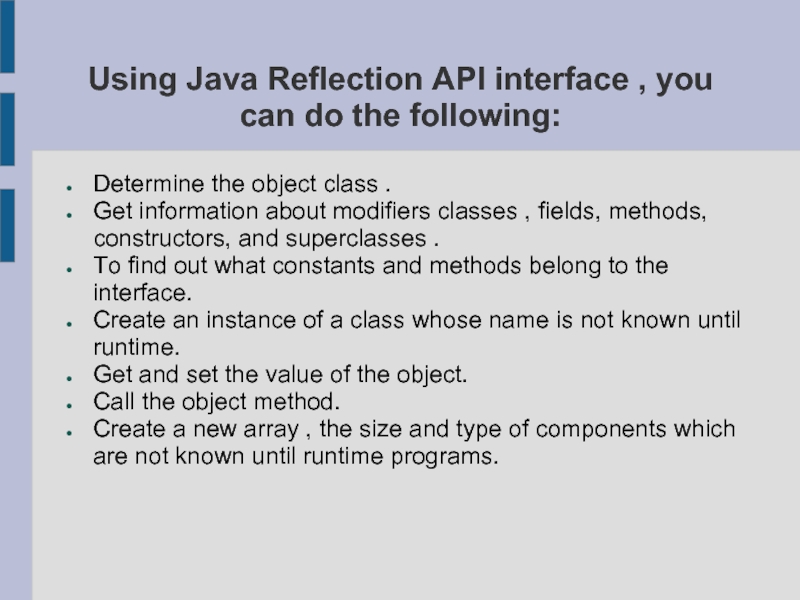
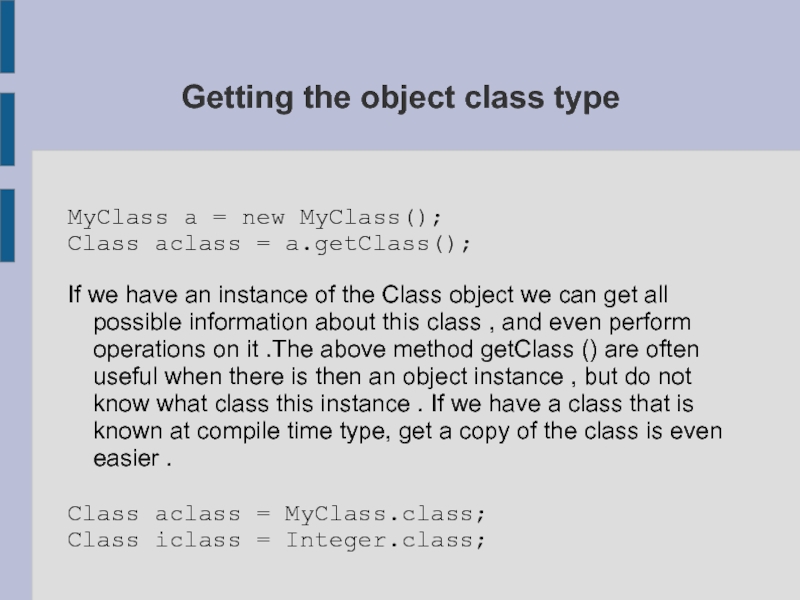
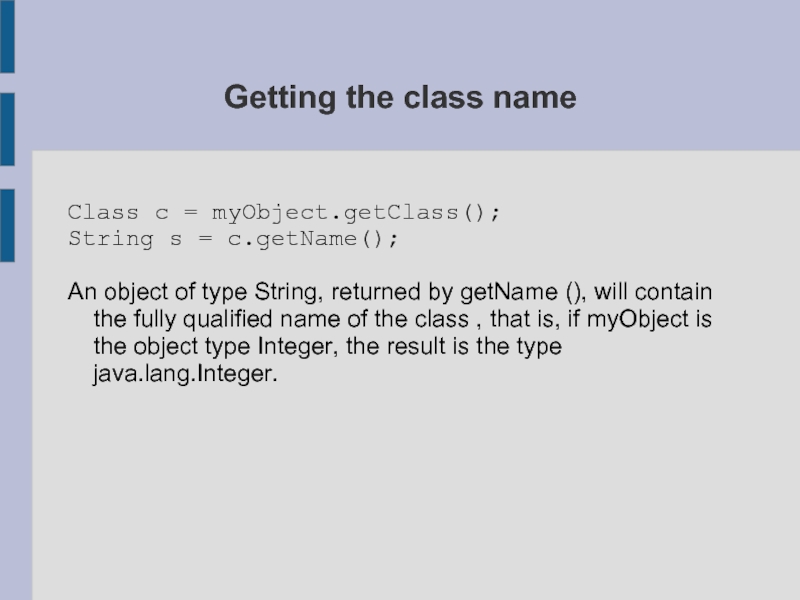
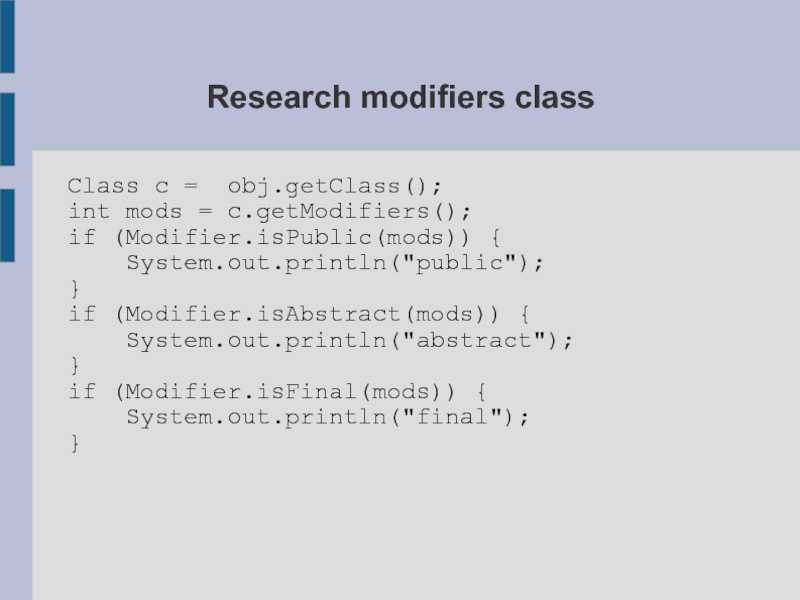
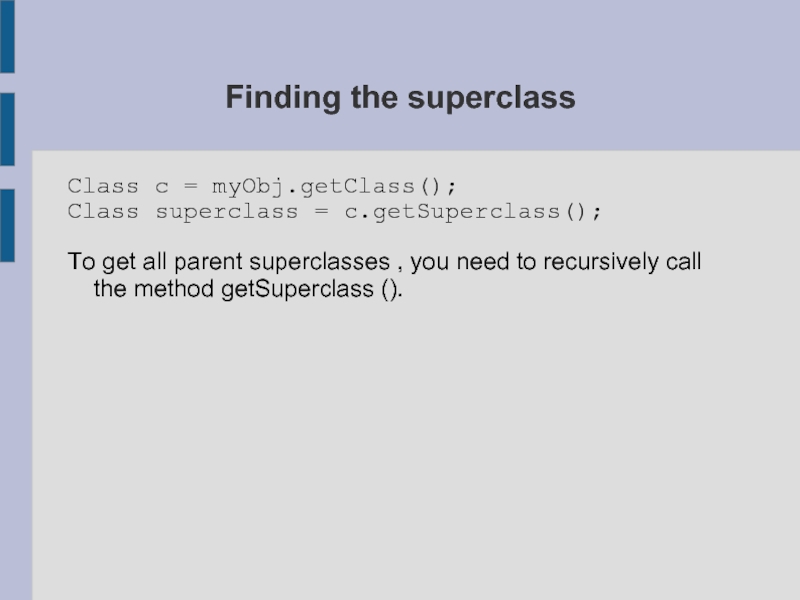
![Research information on the method , the method call .Class c = obj.getClass(); Method[] methods](/img/tmb/3/245106/09999904b575dec31aafc9ca7c854bbe-800x.jpg)

![Research information on the method , the method call .Class c = obj.getClass(); Class[] paramTypes](/img/tmb/3/245106/646226d62a26d39877ceb9288ab4b6cd-800x.jpg)
